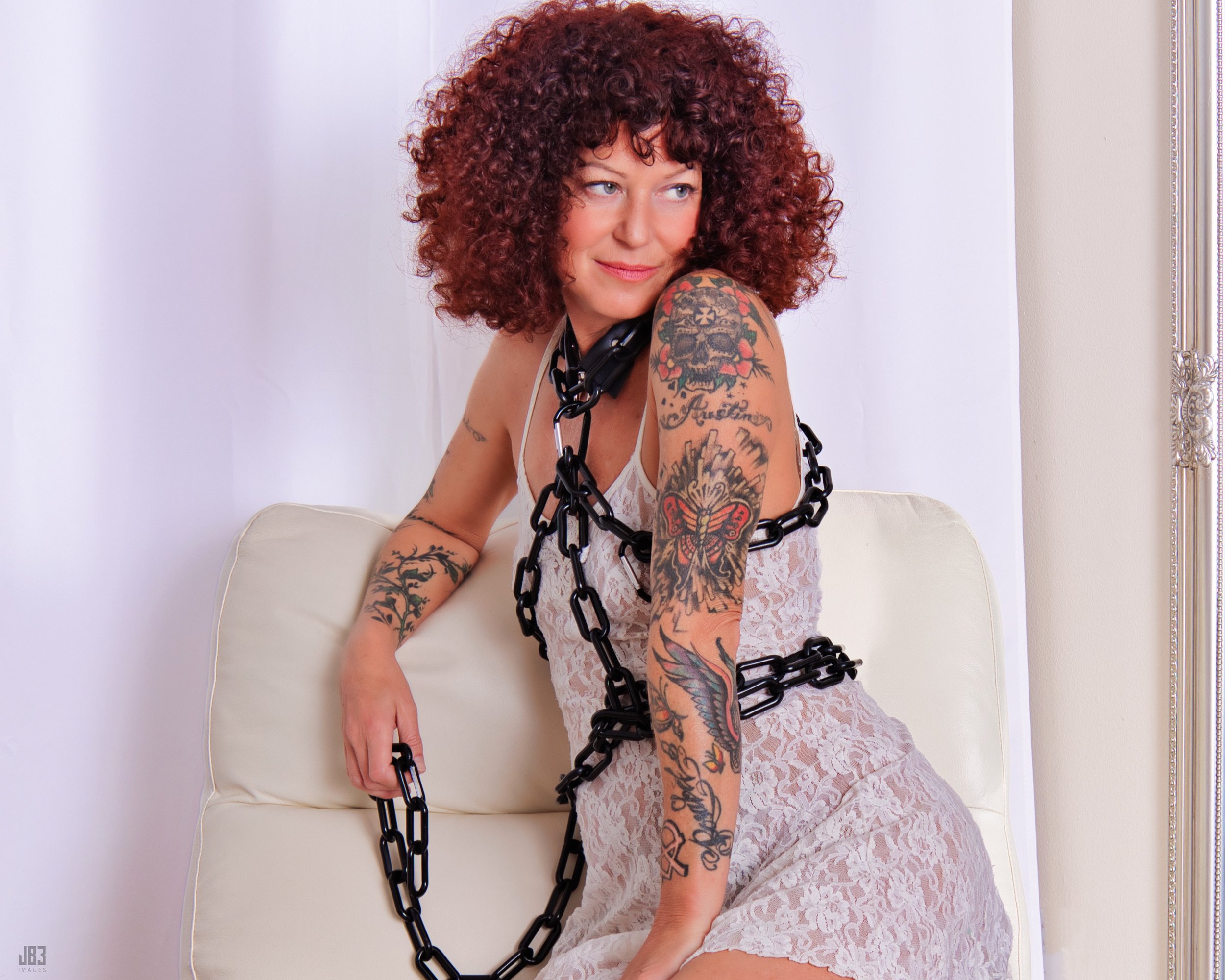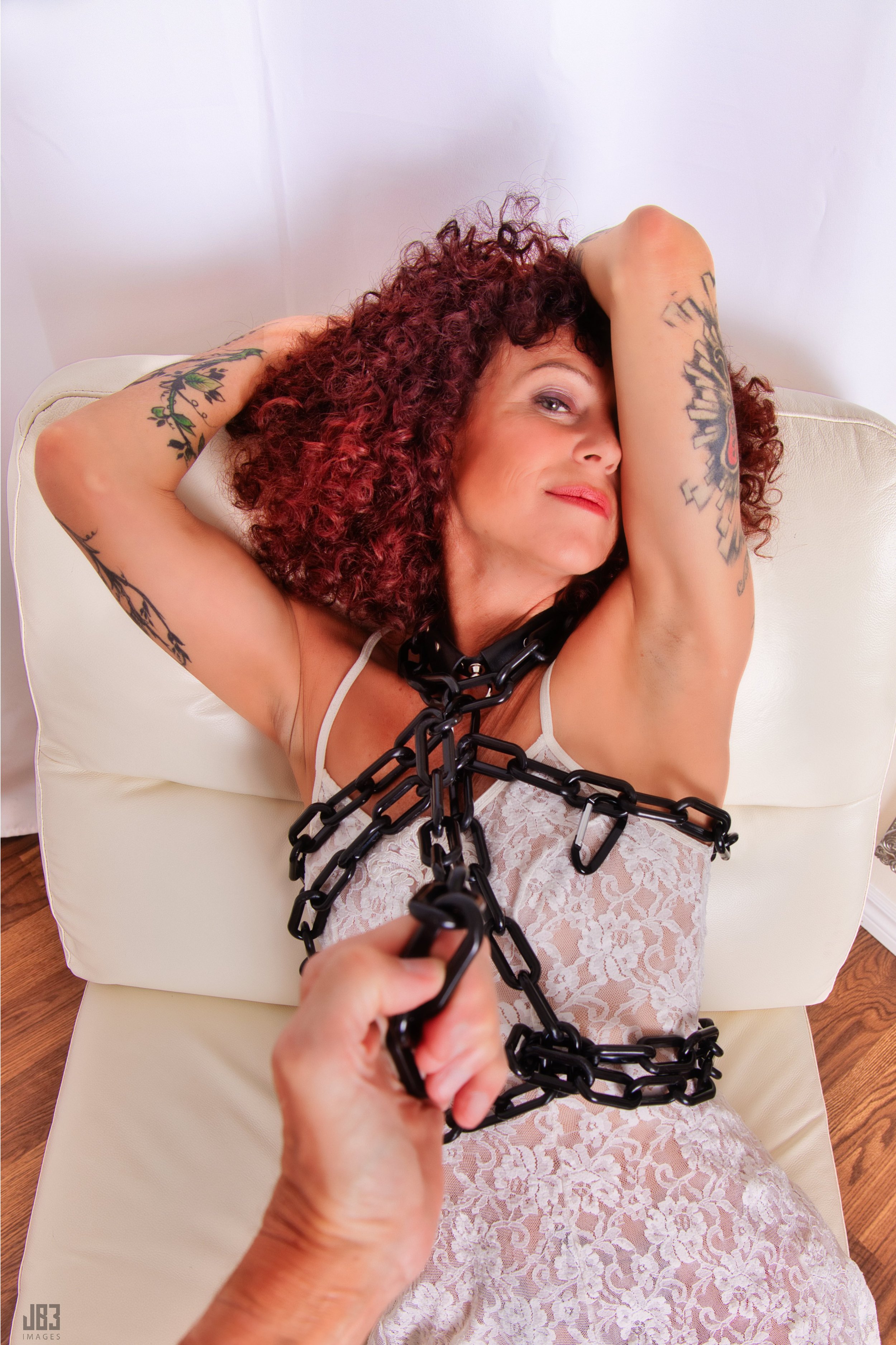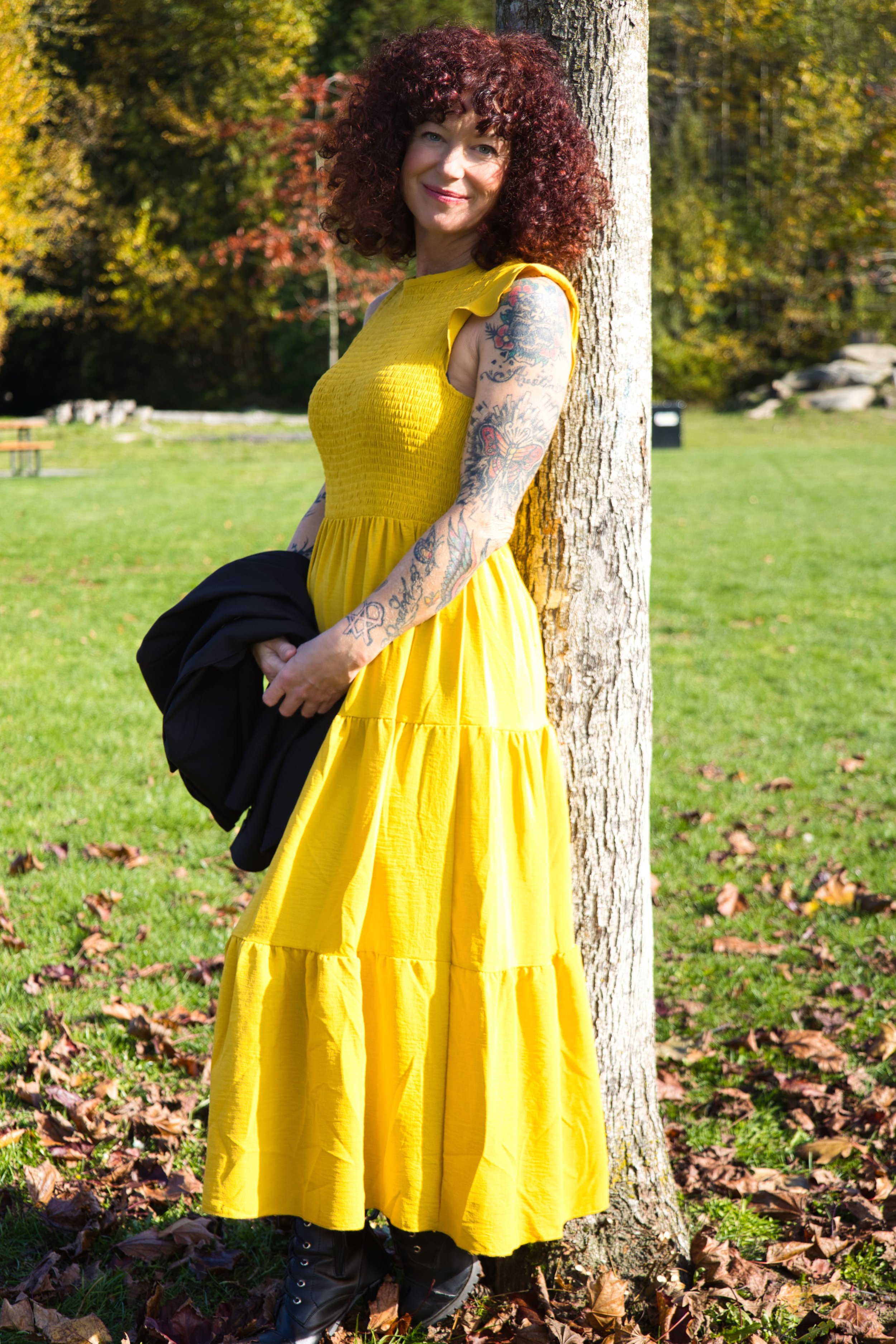BREAKING THE CHAINS OF SHAME
One of the benefits of being a sex worker for over 20 years is that I have no shame. I've been shamed, certainly. To this day I continue to be shamed for choosing this work. People who find out what I do often judge me harshly, assume I am a bad parent, or that I was sexually abused as a child and now I'm acting out. Or maybe I have daddy issues. I've even heard strippers with daddy issues say that they think all strippers have daddy issues.
Do we examine why janitors scrub toilets for a living? Maybe they have latent potty issues that inspire them to work in such a degrading career. I hope you sense my sarcasm here. Sounds pretty ridiculous, doesn't it? There's no shame in being a janitor even though some people would find it degrading. There's no shame in being a sex worker even though some people would find it degrading. The most degrading jobs I ever had were the ones where I made shit money and wasn't allowed to sit down.
But the truth is, I did start out with shame when I first became a sex worker. I was a product of academia and society. Of course, I already knew that society looks down on the sex industry. But I didn’t know about how feminism played a role in the stigma. During my first year of university, straight out of high school, my Women’s Studies class was shown a film called “Not a Love Story.” The film follows a stripper into the clubs to show how degrading and oppressive they are. At the time, I thought the film proved that the sex industry is harmful to women.
Years later, I learned that the stripper in question felt taken advantage of by the filmmakers and claimed to be maliciously and traumatically misrepresented. According to her, the film was biased and taken out of context on many levels. But I didn’t know that when I saw the film in 1993. In 1997, with the memory of that film in my mind, I became a stripper because I was tired of stealing to eat.
I expected stripping to be degrading and oppressive. I viewed my early customers “metaphorically” as disgusting men who objectified women. But in practice, I got along well with most of them and thought many of them were quite wonderful. However, I knew that I was supposed to hate my clients. They were exploiters of women, after all. The thing was, I felt like I was exploiting them more than they were exploiting me. In fact, I would sometimes ask my clients, “Are you sure you want to spend that much?” I obviously cared about their wellbeing.
Less than a year after I started stripping, I enrolled in university again to try and win my mom’s love back. She had been devastated when she learned I was a stripper and had withdrawn largely from my life. It hurt, so I lied to her. I told her I quit stripping and was going back to university. I found myself in a Women’s Studies class again. This time, I was the silent stripper in the class, quietly knowing that the other women in the room didn't know a fucking thing about my industry.
I wanted to write my papers about being a stripper from a feminist perspective of empowerment. I came out to my Teacher’s Assistant privately that I was a stripper. "I don't feel degraded or oppressed," I confessed. She was incredibly supportive and introduced me to a book called “Whores and Other Feminists” that changed my life. Thanks to that TA and her book recommendation, very early in my dancing days I embraced my sexuality. I shed the shame my family and friends (and greater society) tried to force on me.
I'm not saying the sex industry is a pillar of dignity. There is bullshit that can only be truly appreciated from sex workers’ perspectives. But, in my experience, square jobs are MORE degrading. They have offer LESS control and LESS financial security. I think I was destined to become an entrepreneur and the erotic kind is just what happened as a matter of course.
Although my TA was the only “feminist” I’d ever met who didn’t buy into the stereotypes about sex workers, I continued to hide my work at school. I hadn’t found my voice yet, but I was no longer ashamed. I also learned about another important concept in my Women’s Studies class; the concept of “internalized oppression.” Essentially, internalized oppression is when you take a negative stigma that is being used against you and you turn it against yourself. Many sex workers and clients, and people in general, fall victim to internalized oppression.
Stigma bestows less power and privilege to a person who belongs to a social group that is perceived to be inferior or “wrong.” When people are stigmatized or “oppressed” in an ongoing manner for a long time, they come to believe the stereotypes and myths about their own group that are communicated by the dominant group. They accept and absorb their subordinate status as being deserved, normal, and inevitable. When the oppressed begin to believe that the inferiority imposed on them is a natural way of life, they have internalized that oppression. This leads to feelings of shame.
Do you see how this pertains to the sex industry? The dominant group (society) perpetuates myths and stereotypes about groups that are perceived as inferior (sex workers and clients). When we begin to believe in this inferiority, we are internalizing oppression. And it’s not just sex workers and clients, obviously. We have all experienced varying degrees of shame because of oppressive stigma which affects us. It is the reason so many of us stay “in the closet” hiding whatever secret shame we possess. We feel ashamed because society or the people in our lives or both have told us that who we are or what we do and feel is wrong.
Not that all shame is bad. Shame is a feeling that we naturally have. It signals to us that we have done something wrong so that we can correct our course. It is not meant to disable us emotionally, as shame often does. Some people differentiate between healthy shame and toxic shame.
Most toxic shame, I've come to realize, is unconscious. It was planted in our childhoods and blossomed in our teens, when our bodies, sexuality, and sense of a separate-self became suddenly very important. My mother taught me not to be ashamed of my sexuality. However, she was deeply ashamed when I became a stripper. I felt like she was giving me mixed messages. But I didn’t know how to articulate my feelings or confusion to her.
As you know, shame feels like a weapon that slices deep wounds into our souls. I think to be human, we must all know what it feels like. It's that especially deep, dark secret we've never shared with anyone. We have shame for things we’ve done that we regret and we have shame about our bodies, minds, and failures in life. Our shame disabled us from believing in ourselves. Sexual shame, especially, is a huge obstacle to nurturing healthy relationships. Yet sexual desire and interpersonal intimacy are a part of who we are. If we weren’t instinctively horny, the human race would cease to exist. It is programmed into our existence to seek sex. Meanwhile, our society reviles sex. It is not to be talked about and it’s certainly not to be flaunted.
Flaunting our sexuality is one thing. But the worst of all possible things, apparently, is to fuck for money. I giggle even typing that ridiculous statement. How is it horrible to perform intimate or pleasurable services in return for a livable income? Nurses, counselors, RMTs, nail technicians, and even bartenders offer therapy, touch or both for money. It only becomes "wrong" when sexuality is attached to it. It’s called whore stigma. It is practiced even amongst sex workers when a Domme or stripper or adult film performer says "At least I don't fuck my clients."
Whore stigma is based on the stereotype that sex workers are the lowest people in our society. We are further stereotyped to be seen as victims of sexual exploitation. This argument paints men as the perpetrators and completely ignores that male sex workers exist in abundance too. Sex workers are not the victims we are made out to be. As someone who has worked in and out of the sex industry, labour exploitation exists everywhere. I would argue that I am LESS exploited as a sex worker. Are some people trafficked or sexually exploited in the sex industry? Yes. Labour and sexual exploitation are going on in many industries, not just the sex industry. But don’t worry, there’s an easy way to tell the difference. It’s called consent.
Whore stigma for sex industry clients goes something like this ... "I'm so unattractive / shy / awkward / unlovable I have to pay for it." The whore stigma assumes that clients who enjoy our services are unattractive losers who use their power over us (money) to control us (with their penises). Sorry for my sarcastic parentheses. I can’t help it. Let’s be honest about who has the most power in a sex worker / client relationship. Hint: It’s not the client.
Clients of sex workers come from every walk of life. All classes, all races, all occupations, etc. We all have the potential to access the services of sex industry workers. I am occasionally a client; I have paid for the services of sex workers. Some of my favourite people in the world are my clients. The shaming of clients is undeserving and causes many of them to feel deep shame for accessing intimacy services, especially outside of their marriages. People like to believe that married men who see providers are “cheaters.” I beg to disagree. They are not having an affair. They are paying for professional services that should not impact the relationships they have with the people they love. In fact, their loved ones are only impacted if they find out and feel betrayed.
Personally, I prefer being in a relationship where I can talk about these kinds of things with my partner. Because I am a sex industry worker and I attracted a wonderful man who isn’t jealous or controlling, I have the luxury of honesty in my relationship. Most people do not have that luxury. Many seek to have some or all of their intimacy needs met outside their relationships with sex workers and don’t tell their partners, but it doesn’t change or affect their love for their partners. I wish more people understood that. They wouldn’t be so devastated when they catch their partner visiting sex workers. But that’s an article for another day.
FUN FACT: Indoor sex workers (90% of us) are MORE LIKELY to be university educated than non-sex workers. Are you surprised that the lowest in our society are so privileged to be educated? Not to mention, we are intelligent and driven. If you are a client, you probably aren’t surprised because you know us as real human beings. You know the whore stigma is a whole lot of bullshit. But it's different when you turn the whore stigma on yourself. Right?
Well, I'm here to tell you ... unless you're disrespectful, entitled, or predatory towards sex workers, you have nothing to be ashamed of. There is no shame in sexuality; nor in those who seek it nor those who sell it. I can't take your shame away, of course. That work is yours alone. But there are ways for you to process and heal from your shame, no matter who you are or what your shame is about. The secret is to deconstruct it and then change your behaviour to match your new perception of it.
Deconstructing Shame
The first thing we must do is make our shame conscious. We need to recognize exactly what our shame is and where it comes from. What are we thinking or doing when those feelings come on? As a stripper, I felt shame when I phoned my mother because I knew she disapproved of my work. As a mother, I felt shame when I said “no” to my children because they had endured many years of me being too sick to say “yes” to them. Each time I said no, it was compounded upon the years of them not even asking because they could already see that the answer was “no.”
Recognizing that my shame came from my perception of who I thought others expected me to be, rather than who I really was, made me realize that I was doing it to myself. (Internalized oppression.) We can take this a step further to recognize that my shame at any given time is a collective emotion, as well. The things that I feel ashamed of are likely the same things that others feel ashamed of. The reason, of course, is that our collective society determines what we are to feel ashamed about. This suffering that is called shame is not mine alone. It is something we all experience. It is collective suffering, usually otherwise known as stigma.
Now, that we recognize what causes us to feel ashamed and why we feel that way, it begs the question: Does shame make us better people? Yes, or no? Well, healthy shame does make us better. In fact, some scientists have said that our ability to blush and feel shame, or embarrassment, is what makes us human. It is a major part of what separates us from other animals. Toxic shame, on the other hand, is not a constructive energy / emotion. It is destructive, therefore it cannot create harmony. Toxic shame makes us feel separated and alone. It does not bring us together. It is not helpful in any way, shape, or form. It is very harmful.
Knowing that toxic shame is harmful and that it was “given” to us in the form of internalized oppression from the stigma, that is perpetuated by our parents and / or our collective society, opens our minds and hearst to the possibility of healing. So, what if we have desires to be scandalous? It’s time to forgive and accept ourselves; embrace our unique quirks and kinks. As long as we’re not hurting anyone, we have nothing to be ashamed of. It is time that we know it in our bones (or boners, for that matter).
Changing Our Behaviours Toward Shame
Knowing that toxic shame is destructive and unhelpful is not enough to take our shame away. It is deeply embedded. It arises without warning, making us sick with ourselves. Many of us live in shame of mistakes we made in the past, especially mistakes we made as adults (when we should have known better). Shame as parents is also very common. People with addiction, who have let down their families and friends or committed crimes that they regret, often experience ongoing shame, even after they’ve sobered up. It can take them back out, if they don’t heal from it.
Easier said than done, right? How do we heal our shame? It seems impossible because we can’t go back in time and change what we’ve done. This is true, however, what we’ve done can be forgiven. It is possible to forgive ourselves. I am going to help you learn how. First, let’s talk about mistakes and regrets that feed our shame. Reflect on the following ideas around your shame that comes from regrets of the past.
We all make mistakes. And there are no “first” mistakes. It might be the first time YOU have made that mistake. But others have made the same mistake countless times before you. We’ve been making them since humanity began. If you think about it, every mistake is a part of being human because they are human mistakes. If we were slugs, then we’d make slug mistakes. If we were cats, we’d make cat mistakes. But we are not slugs or cats, we’re humans. Therefore, our mistakes are to be expected because they are natural mistakes that humans make.
Tantra says that there are no mistakes, only God experiencing all of the possibilities of Itself. We only believe they are mistakes because we put judgments on them. Instead of judging our mistakes and regretting them as bad things we need to be ashamed of, we can see them as a natural consequence of being Divine and having all possibilities of existence available to us.
Stoicism teaches that mistakes are to be learned from. Marcus Aurelius said, and I’m paraphrasing from memory, that we should never judge others and only judge ourselves for judging others; thereby using our self-reproach to become better at accepting things as they are without judgement.
If we are to judge the mistakes or regrets of our lives, then let’s get to the heart of the matter. The heart of the matter is whether we are good people or not. If not, then this is where we start to heal from shame – by becoming better. Using shame as motivation to do better is productive. Promise to forgive yourself if you do better.
If you have shame around actions that deliberately or inadvertently hurt someone, consider that the painful event was necessary for that person’s personal journey. For instance, I feel guilty because of a man I dated and how he was unable to show my daughter real love when she was growing up. But my daughter would not be who she is today if she did not experience that suffering. She is amazingly compassionate while also having healthy boundaries. I don’t think she could be so strong and loving without her own experience of struggle when she was young. Knowing this has helped me to forgive myself.
In Alcoholics Anonymous there is something called an amends, where you apologize to the people you hurt, accepting that they may not forgive you. They also recommend not making a direct amends if doing so might cause more pain to the person you hurt, or if it could put yourself in danger. In that case, we can do a “living amends,” in which we try to make up for our past mistakes by doing service for the people we hurt, or if that is not possible, then service for others. You don’t have to be an alcoholic in recovery to recognize how powerful these exercises could be.
Now, let’s talk about shame around our bodies and our sexuality. This is a different kind of shame from the one that occurs due to mistakes or regrets. This is a deeply private shame that manifests as insecurity, lack of confidence, jealousy, inability to experience intimacy, and more. As a 50-year-old woman with stretch marks, scars, a missing belly button, wrinkles, and an ostomy, I feel I can really speak to this concept of bodily and sexual shame.
When I first met my partner, I made love with my shirt on. Not because I was embarrassed of my tiny titties, which he may have thought at the time. It was because of the scars on my stomach. I didn’t want him to see them and get turned off. He also had shame around looking at my naked body because his previous partner was extremely insecure. He had learned not to look at her when she had her clothes off. Despite both of us coming into the relationship with sexual shame that mirrored each other’s, we were able to heal together over time. You can heal too. Reflect on the following ideas around your own bodily or sexual shame.
According to Tantra, we are all absolutely perfect just the way we are, beautiful manifestations of Love Energy; God experiencing Itself in our many forms. At our essence, there can be no ugliness because there is no judgment. Our unique “flaws” are actually the different aspects of ourselves that make us more beautiful. Wrinkles, scars, chubbiness, pimples, freckles, stretch marks, skinniness, medical devices, “weirdly-shaped” facial features, “funny-looking” toes, birth marks, and other aspects of our bodies that make us feel insecure or ashamed are God experiencing all the possibilities of Itself through us. Therefore, we must stop putting a judgment on them. They are not bad or good, they just are. And they are beautiful, because they are Divine.
In terms of sexual pleasure and kinks, Tantra similarly teaches that our sensual experiences are another way that God experiences Itself through us. In fact, sensual pleasure is the most profound way that God can experience Itself and that we can experience our Divinity. Through sensual touch, we can experience ourselves on every level of our existence. Tantra suggests that there are six layers to the “self.” I’ve included sexual examples that I created to help us to identify the layers of self that we experience during tantric sex:
The Material Self – “I am making love on this beautiful bed, wearing sexy lingerie, and using high quality accessories.”
The Physical Body – “I am experiencing the incredible sensations of touch.”
The Heart-mind/ Energy body – “I am aroused beyond imagination.” (This is the layer of thoughts and feelings and it is the layer we identify most with.)
The Lifeforce – “I feel ecstatically energized.”
The Transcendent Void – “I am drifting in the transcendent void, neither here nor there nor anywhere, on a cloud of sensation.”
The Power of Awareness – “I am the divine consciousness of every level of my being during these glorious moments of passion and connection.”
Intimacy is a need, not a want. Science backs me up on this. Newborn babies cannot survive without touch and human connection. Marriages that are devoid of touch and intimacy are hollow shells of what could be. No one should be required to live without intimacy because of vows made when our partners still touched us. The people who withhold intimacy are the ones who are starved the most. But we can’t force it on them. They have to find a way to heal themselves. Sometimes a relationship must end for individuals to reclaim intimacy in their lives and let go of resentments that hold them back.
Shame stemming from abuse or trauma has a narcissistic habit of making us feel like it was our fault, or that something we did or said was wrong. If we were sexually abused as children and loved the person who abused us, or even enjoyed their taboo touches, we may feel deep shame for those feelings. As adults, we ask ourselves if we “asked for it” because of the way we dressed or because we drank too much. People even shame us for being victims of sexual harassment and abuse. All of this contributes to our feelings of shame. We are internalizing oppression when we shame ourselves for the abuse we’ve experienced. We must remember that we didn’t ask to be abused. And then, we must choose to heal from the abuse. Holding onto toxic behaviours of shame absolutely prevents us from healing.
I’ve offered ideas for how our perspectives can be shifted to view the things that make us feel toxically ashamed in a new and healing way. It is absolutely each of our own responsibility to heal from our traumas and shame. No one else can do it for us. Life without debilitating shame is possible. I’ve lived with it and I’ve healed from it. It knocks on my metaphorical door sometimes. I am cordial and loving with my energy but I shut the door in the face of shame. Life is too short to live like that.
Love Annie xoxo
If you enjoyed this article, please scroll down and subscribe to my newsletter!




